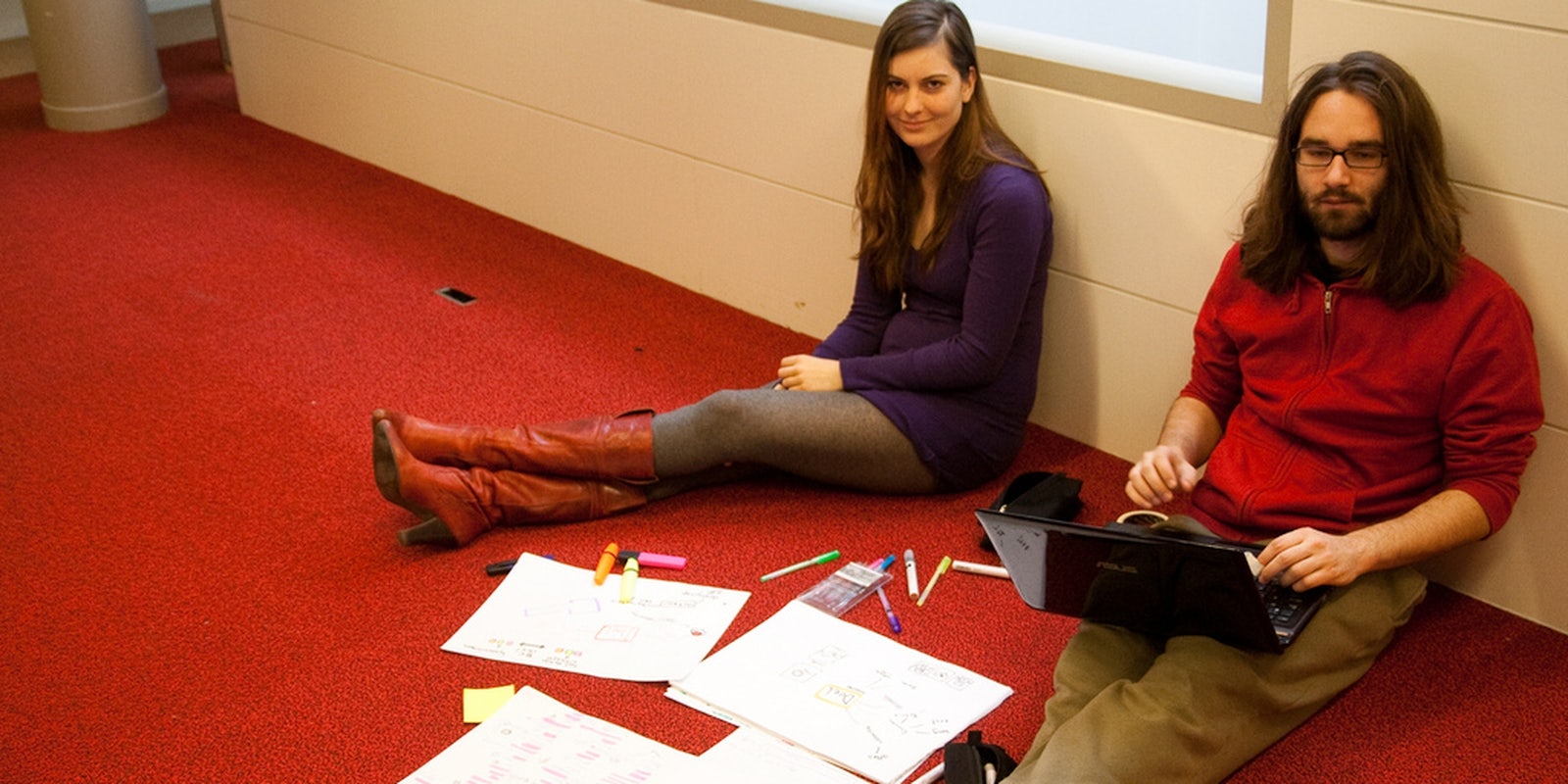It’s the most wonderful time of the year: when people start writing think-pieces about the interns they’re going to have to deal with come summer.
The New York Times kicked off this year’s festivities on Friday with a look at how young people find themselves stuck in a never-ending “cycle” of internships. BuzzFeed’s Doree Shafrir kept the party going with her response on Tuesday (which just so happened to coincide with a Bret Easton Ellis interview at Vice about how terrible young people are these days).
As usual, nobody guiding the conversation seems to have anything resembling a realistic grasp on what it is to be young—you know, “the future”—and trying to enter the job market.
That is not to say there’s no one out there doing good work on the value (and harm) of unpaid and underpaid labor. Cord Jefferson’s Gawker essay “When People Write for Free, Who Pays?” springs immediately to mind, as does Madeleine Schwartz’s Dissent story “Opportunity Costs: The True Price of Internships.” This summer Michelle Chen wrote an excellent story for In These Times, “For Disgruntled Young Workers, Lawsuits May Spark Intern Insurrection.” (One can only hope!) But these are not a part of the mainstream conversation about internships. The conventional wisdom about internships is something like this (straw-man alert):
Look, it sucks that you have to work for no money. But you’re getting great experience, and these are connections you’ll be able to use for the rest of your life.
Not wrong! Or at least, not completely wrong. There are plenty of terrible internships that have no value whatsoever: internships that consist entirely (or almost entirely) of fetching coffee and making copies. But then, not all internships are like that. I’ve had three good ones. I’ve been lucky.
Only my internship at the Nation paid any money at all: $150 a week. When I was writing for HyperVocal, I lived at home and worked in a bar, and when I was writing for the Awl, I made grilled-cheese sandwiches in a food truck. Toward the end of the stint at the Nation, our cohort agitated for a change to the program; now the magazine pays its interns minimum wage and issues unlimited MetroCards.
Many former unpaid interns are afraid to speak up for fear that they’ll alienate former companies/bosses. This includes me. #MyInternship
— Andrea Garcia-Vargas (@AndreaGarVar) February 18, 2014
It took me a year to make reasonable money in my field, but I have no horror stories. Maybe my experience is atypical.
Friday’s New York Times story was about how young people—“millennials”—find themselves moving from internship to internship without ever getting hired anywhere, eternally in search of a salary, of benefits, of health insurance—you know, stability.
The Times quotes kids who are just out of college as well as people closing in on 30; many express a resilience—a sort of grimly determined optimism—that is, in my book, admirable. Others, however, seem a bit delusional, which is what Doree Shafrir seizes upon. “When we get internship applications from people who have had three, four, five, or more internships in our field,” she writes, “with no full-time job on their résumé, it is kinder for us to reject them than perpetuate the hope that they might one day break through.”
 Maybe Shafrir is right—maybe those of us who have slogged through three or more internships in our field of choice are wasting our and everybody else’s time, and it’d be better for everyone if we just threw in the towel. Sure. Then again, maybe this completely ignores the endless precarity that has come to define the post–Great Recession economy, especially for young people, and especially for young people in creative industries. Steady, full-time employment is not something anybody can count on anymore, as more and more workers in all kinds of industries cobble together part-time, freelance, and temporary work.
Maybe Shafrir is right—maybe those of us who have slogged through three or more internships in our field of choice are wasting our and everybody else’s time, and it’d be better for everyone if we just threw in the towel. Sure. Then again, maybe this completely ignores the endless precarity that has come to define the post–Great Recession economy, especially for young people, and especially for young people in creative industries. Steady, full-time employment is not something anybody can count on anymore, as more and more workers in all kinds of industries cobble together part-time, freelance, and temporary work.
Getting passed from internship to internship, doing good work that 20 years ago someone would have been paid a living wage to do—or even a real salary—isn’t just demoralizing. It’s “good experience.” It builds character. (Seriously!) It rewards persistence and gumption and, indeed, resilience.
It also, however, rewards privilege. Who has the means to persist? Folks who have outside support, whose families are able to help out with rent and with groceries. That’s my story, anyway. I am the beneficiary of two generations of immigration and sacrifice: the heir to a wealth of opportunity that my parents and their parents never had. But just because I have benefited from my privilege and from a year of unpaid and underpaid internships doesn’t mean that it’s right. In fact, I would go so far as to say that not only is the internship system immoral and unjust, it is also—wait for it—killing journalism.
I still know the precise Starbucks coffee orders of over 10 mid-level fashion editors. Def doesn’t make me a better writer. #myinternship
— Rega Jha (@regajha) February 18, 2014
The conjunction of the Internet’s ascendancy and the global economy’s collapse precipitated a paradigm shift in the media industry. Our landscape is still in flux. A number of existential questions remain, the answers to which will determine the future of our trade and the role it plays in this democracy—that is, its status as a powerful and effective Fourth Estate.
However, the longer this industry relies on internships, the more it relies on unpaid or underpaid labor to fill the vacancies left by eliminated entry-level positions, the less and less diverse the pool of applicants for those internships will become. The more homogenous it becomes, the more stagnant it becomes. And in that stagnance is death.
The contraction of the American middle class in this Second Gilded Age of ours has consequences at every level of our society. Journalism is no exception. With all due respect to the New York Times, when the college-educated adults of this country are strapped with $1 trillion in student debt, the next generation’s best and brightest aren’t hopping from internship to internship, carrying dreams of Pulitzer prizes and entrepreneurship with them, but rather slaving away at meaningless jobs just to pay back the bills they incurred to receive the higher education that should really be a right.
Employers need a system to fairly evaluate all applicants, not rely so heavily/lazily on referrals. #myinternship #endlesscycleofprivilege
— Anita Badejo (@anitabadejo) February 18, 2014
In her piece, Shafrir brings up the myth of the “Trophy Kid.” This is the idea that millennials are overly sensitive and entitled because growing up, everyone got a medal for everything. Shafrir quotes Megan McArdle, author of The Up Side of Down: Why Failing Well Is the Key to Success, who writes that Kids These Days were “brought up to believe that there should be no winners and no losers, no scrubs or MVPs. Everyone, no matter how ineptly they perform, gets a trophy.”
This idea is only remarkable for its stupidity and its persistence. This is not a thing that any young person actually believes. If anything, getting trophies after every T-ball season instilled my peers and me with a (very reasonable) cynicism about the artifice of awards and the stratification they imply. It is not for nothing that this is a generation more aware and realistic about the inequities of capitalism than any other. What do you expect when you give folks a college education and then deny them meaningful work? (Whoops!)
Most people—whether they are millennials or Olds—don’t want to be the next Steve Jobs, despite what anecdotal evidence the New York Times offers. Most of us want jobs that enable us to support ourselves, and maybe, eventually, our families. And we want jobs that make us feel good about ourselves, that enable us to find value and satisfaction in our work. Work—meaningful work—not entitlement; it is a human right.
Then again, this is all entirely speculative, unreported, and unscientific. But so is everything else anybody writes about this generation.
Anyway, here’s a more reasonable solution for fixing internships, journalism, and the economy: Stop shifting the blame to 20-somethings. Ban internships, and forgive student-loan debt.


